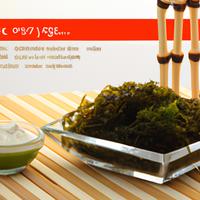
1 serving (100 grams) contains 49 calories, 1.5 grams of protein, 0.2 grams of fat, and 12.3 grams of carbohydrates.

Log this food in SnapCalorie

Nutrition Information
Calories |
116.7 | ||
|---|---|---|---|
% Daily Value* |
|||
| Total Fat | 0.5 g | 0% | |
| Saturated Fat | 0.2 g | 1% | |
| Polyunsaturated Fat | 0 g | ||
| Cholesterol | 0 mg | 0% | |
| Sodium | 159.5 mg | 6% | |
| Total Carbohydrates | 29.3 g | 10% | |
| Dietary Fiber | 3.1 g | 11% | |
| Sugars | 1.4 g | ||
| protein | 3.6 g | 7% | |
| Vitamin D | 0 mcg | 0% | |
| Calcium | 171.4 mg | 13% | |
| Iron | 21.2 mg | 117% | |
| Potassium | 150 mg | 3% | |
* Percent Daily Values are based on a 2,000 calorie diet. Your daily values may be higher or lower depending on your calorie needs.
Food Attributes
Source of Calories
About Seamoss
Sea moss, scientifically known as *Chondrus crispus*, is a type of red algae widely harvested from the Atlantic coasts of Europe and North America. Traditionally used in Irish and Caribbean cuisines, sea moss is gaining popularity for its nutritional benefits. Rich in essential minerals like iodine, magnesium, potassium, and calcium, it supports thyroid health, digestion, and immunity. High in antioxidants, it may aid in reducing inflammation and improving skin health. Sea moss also contains important vitamins, including B vitamins and vitamin C, making it a nutrient-dense addition to smoothies, soups, or sauces when used in its gel or dried form. While generally regarded as healthy, excessive consumption can lead to an overload of iodine, so moderation is key. Its versatile nature and nutrient profile make it a sought-after superfood for those looking to enhance their wellness naturally.



